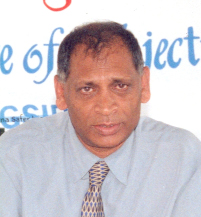A new rice seed facility will be commissioned next month at Number 56 Village Corentyne, Berbice, Minister of Agriculture Dr Leslie Ramsammy said yesterday while hailing major improvements in the agricultural sector.
Speaking at a press conference in the Ministry of Agriculture Board Room,
Ramsammy lauded the rice industry’s performance.
“Undoubtedly, the outstanding performance came from the rice industry. There can be no doubt that the rice industry has contributed to achieving the mandate of the agriculture sector. It is ensuring food security, contributing to Guyana’s export strength, creating employment and generating wealth for our people”, he said.

He said the seed facility was as a result of the Agriculture Sector Support Programme (ASSP) and is intended to increase Guyana’s capacity to produce pure variety rice seeds for farmers. “Production of pure variety seeds is important as we pursue greater yield for rice,” he added.
“There were several infrastructure development initiatives that were undertaken by the [National Drainage and Irrigation Authority] NDIA and for the livestock industry, crops, fishing and marketing, as part of the ASSP and the Agriculture Export Diversification Program (AEDP). Strengthening the infrastructure for agriculture is an imperative. Without suitable infrastructure agriculture cannot be developed, sustained or expanded.”
The minister said that the livestock industry is an important sub-sector for the overall economic and social development for Guyana. It plays a critical role in meeting food security for the nation and in reducing importation of food. It is a major player in creating employment for people and in supplementing incomes for families.
In this vein, the minister mentioned that the Artificial Insemination (AI) Laboratory is an important component of the infrastructure to support improved genetics and breed improvement in the cattle industry. This construction was as a result of the AEDP. The AI Laboratory will improve the artificial insemination programme for livestock.
Meanwhile, six new mobile pumps were procured as part of an arrangement with EXIM Bank, India, in a partnership between the Government of Guyana and the Government of India. These pumps will assist in the drainage programme during the rainy season. Some of these pumps will be used at permanent sites and others will be kept and moved to areas where additional pumping capacity is needed, the minister said.
Upgrading and rehabilitation of existing Drainage & Irrigation infrastructure remains a major priority. During 2012, the NDIA continued to implement an aggressive plan for upgrading and rehabilitation of drainage and irrigation infrastructure to ensure optimum capacity, Ramsammy said. The NDIA through its Community Drainage and Irrigation Project (CDIP) has also been supporting vulnerable residential areas by clearing critical drains and canals.
“The fishing industry continues to grow in economic importance in Guyana. It provides a source of relatively cheap animal protein and also provides employment for many persons in the rural areas,” Ramsammy said.
He mentioned that the Pesticides and Toxic Chemicals Control Board commenced the year 2012 with the vision of strengthening numerous chemical management instruments in Guyana so as to ensure safe use of chemicals in the food production chain. The board has the mandate to ensure that only safe chemicals are imported, sold and used in Guyana. It also helps to monitor food for pesticide residues.
“We will seize any chemical that is not properly labelled, if they are found,” said Ramsammy. “To my farmer brothers and sisters, if you does buy from an unregistered vendor, please don’t call me. If you are not registered to sell the pesticide and they take from you, please don’t call me.”




